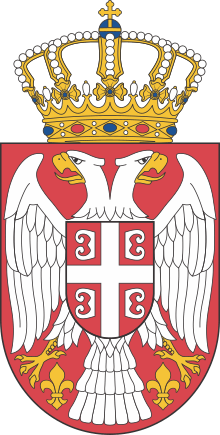1901 Serbian Senate election
Senate elections were held in Serbia on 5 August 1901.[1] They followed the promulgation of a new, liberal constitution in May, which created a bicameral People's Representative Body consisting of an elected National Assembly and a largely appointed Senate. The National Assembly had been elected in May 1901.
 |
|---|
| This article is part of a series on the politics and government of Serbia |
|
|
Legislature
|
|
Judiciary
|
|
|
Electoral system
The Senate consisted of 30 members appointed for life membership by the King and 18 members elected for six year terms.[1] Membership was limited to people aged 40 or over and who had paid at least 200 dinars in annual taxation, although the taxation requirement was waived for a range of former public officials, including ex-ministers and diplomats.[1] Voting rights were granted to men over the age of 21 who paid at least 45 dinars a year in direct taxation.[1]
Results
The elections were marred by demonstrations in Belgrade, during which the police arrested and killed several demonstrators.[2] Although the People's Radical Party won a majority of seats,[3] they were only offered three ministerial positions by King Alexander,[4] with independent Aleksa Jovanović becoming Prime Minister.
Aftermath
The combined People's Representative Body met for the first time on 1 October.[5] Rista Popović was elected as Speaker of the National Assembly and Dimitrije Marinković as Speaker of the Senate.[5]
References
- Čedomil Mitrinović & Miloš Brašić (1937) Les Skoupchtinas et les Diètes Yougoslaves
- André Gerrits & Dirk Jan Wolffram (2005) Political Democracy and Ethnic Diversity in Modern European History, Stanford University Press, p40
- Christopher Clark (2012) The Sleepwalkers: How Europe Went to War in 1914, Penguin UK
- Alex N. Dragnich (2004) Serbia Through the Ages, East European Monographs
- Octroyed Constitution and the bicameral People’s Representative Body (1901-1903) National Assembly